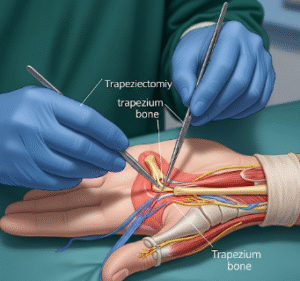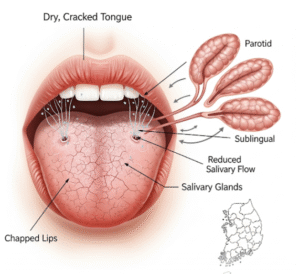Overview
Nausea and vomiting are common symptoms experienced by people of all ages. Nausea refers to the sensation of unease or queasiness in the stomach, often accompanied by the urge to vomit, while vomiting is the forceful expulsion of stomach contents through the mouth.
These symptoms are not diseases themselves but rather indicators of underlying conditions, ranging from minor gastrointestinal disturbances to serious systemic illnesses. In Korea, healthcare providers focus on diagnosis, symptomatic relief, and treating underlying causes.
Key Facts
➤ Nausea and vomiting can occur suddenly or gradually and may be acute or chronic.
➤ Common triggers include infections, food poisoning, motion sickness, pregnancy, medications, and stress.
➤ Persistent or severe vomiting may lead to dehydration, electrolyte imbalance, or nutritional deficiencies.
➤ They are often self-limiting, but underlying causes must be identified if symptoms persist.
➤ In Korea, management combines medical therapy, IV hydration, and advanced diagnostic tools when needed.
What is Nausea & Vomiting?
Nausea is the subjective feeling of sickness with the inclination to vomit, whereas vomiting (emesis) is the physical act of expelling stomach contents.
➔ Vomiting is controlled by the vomiting center in the brainstem, which receives signals from:
- Gastrointestinal tract (irritation, infection, obstruction)
- Inner ear (motion sickness)
- Central nervous system (migraine, increased intracranial pressure)
- Chemoreceptor trigger zone (medications, toxins, pregnancy hormones)
Nausea often precedes vomiting, but vomiting can also occur without preceding nausea.
Symptoms Related to Nausea & Vomiting
➤ Queasiness or discomfort in the stomach.
➤ Retching or dry heaves without producing vomitus.
➤ Forceful expulsion of stomach contents.
➤ Loss of appetite or food aversion.
➤ Associated symptoms depending on cause:
- Fever, diarrhea (infection)
- Dizziness, vertigo (inner ear problems)
- Headache or lightheadedness (migraine)
➤ Signs of dehydration: dry mouth, reduced urine output, weakness.
Causes / Possible Causes
Gastrointestinal Causes
➤ Gastroenteritis – viral or bacterial infection of the stomach/intestines.
➤ Food poisoning – ingestion of contaminated food or toxins.
➤ Obstruction – blockage in stomach or intestines.
➤ Ulcers or gastritis – inflammation of stomach lining.
Neurological Causes
➤ Migraines causing nausea.
➤ Increased intracranial pressure or head injury.
➤ Motion sickness due to inner ear disturbances.
Systemic & Metabolic Causes
➤ Pregnancy – especially morning sickness in early pregnancy.
➤ Medications or chemotherapy.
➤ Kidney or liver disorders, leading to toxin accumulation.
➤ Endocrine disorders, such as diabetes (diabetic ketoacidosis) or thyroid imbalances.
Psychological Causes
➤ Anxiety, stress, or emotional triggers.
➤ Psychogenic vomiting in rare cases.
Risk Factors
➤ History of motion sickness, migraines, or gastrointestinal sensitivity.
➤ Use of medications known to cause nausea, such as chemotherapy or opioids.
➤ Pregnant women, especially in the first trimester.
➤ People with underlying chronic illnesses affecting liver, kidneys, or GI tract.
➤ Children and older adults are more vulnerable to dehydration from vomiting.
Complications
Persistent nausea and vomiting can lead to:
➤ Dehydration and electrolyte imbalances.
➤ Weight loss and malnutrition if prolonged.
➤ Esophageal tears (Mallory-Weiss syndrome) in severe cases.
➤ Aspiration pneumonia if vomitus enters the lungs.
➤ Worsening of underlying diseases if untreated.
When Should I See My Doctor?
Seek medical attention if:
➤ Vomiting lasts more than 24–48 hours in adults, or more than a few hours in infants and children.
➤ Presence of blood, bile, or coffee-ground material in vomitus.
➤ Symptoms of severe dehydration: dizziness, low urine output, dry mouth.
➤ Abdominal pain, fever, or neurological symptoms accompany vomiting.
➤ Vomiting interferes with nutrition, hydration, or daily activities.
Care and Treatment
Lifestyle and Home Measures
➤ Hydrate frequently with water, oral rehydration solutions, or clear broths.
➤ Eat small, bland meals (toast, rice, bananas) to reduce stomach irritation.
➤ Avoid strong odors or foods that trigger nausea.
➤ Rest and avoid sudden movements if dizziness or motion triggers vomiting.
➤ Ginger or peppermint may help reduce nausea naturally.
Medical Treatments
➤ Antiemetic medications (ondansetron, metoclopramide, promethazine) to control nausea.
➤ IV fluids and electrolytes for severe dehydration.
➤ Treatment of underlying causes: infection, metabolic disorder, medication adjustment.
➤ Hospitalization in severe or persistent cases for monitoring and advanced care.
Preventive Measures
➤ Avoid known triggers such as motion, certain foods, or medications.
➤ Maintain hydration during illness or travel.
➤ Early intervention for underlying gastrointestinal or systemic conditions.
➤ Proper diet and small, frequent meals during pregnancy to prevent morning sickness.
Treatment Options in Korea
Korean healthcare offers comprehensive management of nausea and vomiting, including:
Diagnostic Services
➤ Blood tests to assess electrolytes, liver, and kidney function.
➤ Imaging studies (ultrasound, CT, endoscopy) for GI or neurological causes.
➤ Pregnancy testing and obstetric evaluation if relevant.
➤ Consultation with gastroenterology, neurology, or internal medicine specialists.
Therapies and Supportive Care
➤ Prescription antiemetics and supportive medications.
➤ IV hydration therapy for severe dehydration.
➤ Nutritional counseling for chronic vomiting or pregnancy-related nausea.
➤ Minimally invasive treatments for GI obstructions or ulcers.
➤ Integrative approaches combining Western medicine and traditional Korean remedies such as herbal treatments for nausea.
✅ In summary: Nausea and vomiting are common symptoms with multiple potential causes, ranging from mild infections to serious systemic conditions. In Korea, patients benefit from accurate diagnosis, supportive care, antiemetic therapy, and advanced interventions to manage symptoms, prevent complications, and address underlying health issues effectively.













